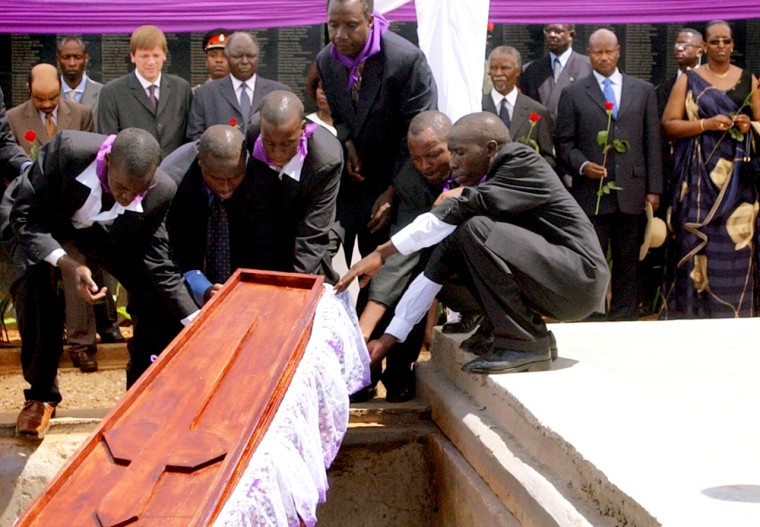Wednesday was designated by the United Nations as an International Day of Reflection on the 1994 Genocide in Rwanda in which an estimated 800,000 people were killed.
Ceremonies around the world were attended by representatives from the United States, the European Union and the African Union, so the world will be mindful of Rwanda in a way it never was 10 years ago.
In Geneva, U.N. Secretary-General Kofi Annan called on the international community to stay alert for warning signs to prevent a repeat of massacres like that in Rwanda.
“We must all acknowledge our responsibility for not having done more to prevent or stop the genocide,” Annan told the U.N. Human Rights Commission, which observed two minutes of silence to honor the victims.
“We cannot afford to wait until the worst has happened, or is already happening, or end up with little more than futile hand-wringing or callous indifference,” Annan said.
In 1994 the outside world turned its back as extremists within the Hutu-led government began their plan to systematically kill all of the country’s minority Tutsi population and those Hutus who were politically moderate.
The genocide lasted until July, when a Tutsi rebel army, led by the current President Paul Kagame, took the capital, Kigali. This prompted the exodus of two million Hutus, including those responsible for organizing the massacres, into neighboring Democratic Republic of Congo.
Recovery: slow, but certain
Since the genocide, Rwanda has been relatively stable and internally peaceful. The economy is growing: tea and coffee production has returned to pre-genocide levels, as has GDP after falling by nearly 50 percent after 1994.
Kagame’s ruling party, the Rwandese Patriotic Front (RPF), abolished the system of identity cards based on race and urges people to think of themselves as Rwandan rather than as Hutu or Tutsi. They are keen to promote unity and reconciliation. Even the Hutu militants still hiding in eastern DR Congo are encouraged to return home for rehabilitation into society.
In a sign of progress, five licenses for private radio stations, the first for Radio 10 in Kigali, have been issued. During the genocide, radio was used as a tool to foment violence. The government closely monitors the new stations, but Radio 10’s Eugene Nyagahene claimed, “There are no limits to what radios can put on air except for appeals to ethnic-hatred.” Time will tell.
Enduring problems
Encouraging signs, but Rwanda still has many problems. The U.K.’s Department for International Development (DFID) said that there are only 274 qualified doctors in the entire country. That equals one doctor for every 14,599 Rwandans.
Amnesty International estimates that some 250,000 women were raped during the genocide, and now seven out of ten survivors are infected with HIV/AIDS. Money for anti-retroviral drugs is in short supply condemning many to a slow, early death.
Critics and aid groups also accuse Kagame of presiding over one of the most authoritarian governments on the continent. Power is concentrated in the hands of a small Tutsi elite. In reality, there is no freedom of association or a free press as the government fears that could destabilize the country. Legislation has been passed to criminalize “divisive” speech.
The U.S. State Department recorded the disappearance of at least six Rwandan opposition leaders last year and last week Robert Sebufiria, editor of one of Rwanda’s few independent newspapers, fled the country after reportedly being threatened by state security agents.
'Moving in the right direction'
Rwanda’s foreign donors tend to look on the bright side.
On Tuesday, Britain's Prime Minister Tony Blair issued a statement describing Rwanda’s progress over the last 10 years as a “truly remarkable achievement.” Britain has been Rwanda’s biggest donor since the genocide, this year giving approximately $68 million, which will rise to an estimated $72 million next year.
The U.K. International Development Secretary, Hilary Benn, who represented Britain at events in Rwanda, conceded recently that the elections which saw Kagame gain 96 percent of the vote, “weren’t perfect,” but added, “I think unquestionably the country is moving in the right direction.”
Traditional justice takes over
Rwanda must also deal with the 90,000 genocide suspects languishing in its over-crowded jails.
Due to the massive burden this places on the justice system, 23,000 prisoners who had already confessed their crimes were released earlier this year to face trial in traditional village courts known as “gacaca.”
Another 30,000 are expected to be released this June, but with gacaca courts operating on a pilot scheme in only 10 percent of villages, most of those released will not face justice any time soon. Instead they will be sent back to live side by side with the same people they had previously sought to murder.
Next door in Tanzania, the International Criminal Tribunal for Rwanda (ICTR) is trying those accused of masterminding and leading the genocide. So far 18 people have been convicted, receiving sentences from 10 years to life imprisonment; another three have been acquitted.
The previous chief prosecutor for the ICTR, Carla Del Ponte, claimed that the Rwandan government was unhappy with having RPF soldiers investigated for the reprisal killings that took place during the months after the genocide.
RPF forces are allegedly responsible for killing up to 200,000 people when they pursued the fleeing Hutu militia into DR Congo. The RPF subsequently became embroiled in the Congo’s civil war, which claimed 3 million lives and stands as one of Africa’s worst conflicts.
It remains to be seen if Del Ponte’s successor, Hassan Jallow, will continue the efforts to investigate the RPF. At the moment the ICTR is not trying any member of the RPF.
Meantime, thousands gathered Wednesday at the Amahoro Stadium in Kigali to begin the week of reflection. Countless more up and down Rwanda will also remember.
While a repeat of the horrors of 10 years ago currently seems unlikely, Rwanda is still coming to terms with what happened.
For the genocide-survivors this could continue indefinitely, but some may take heart that the worst is perhaps over.
